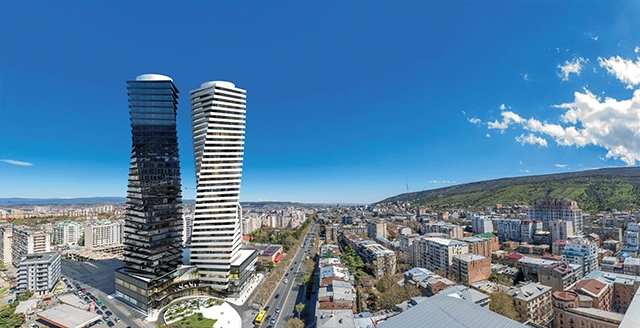Urban Planning in a Democratic Georgia
Now that the Republic of Georgia is managing its own government, developing its own agencies and establishing its own purposes and procedures, what is the country’s ability to plan for its future? In light of Tbilisi’s recently completed General Plan, the answer to this question is important for those looking for improvement in Tbilisi’s urban structure. Evidence of chaotic development is all too common.
Four years ago, systematic consideration of Georgia’s urbanization was only beginning to surface according to urban planner Gogi Abashidze, one of four panelists who spoke at a Capstone Seminar on the topic of urban planning. He joined Davit Asanidze, Head of Urban Policy & Planning for Tbilisi, Anano Tsintsabadze, an attorney with legal experience in planning issues, and Roger Akeley, a guest planner from New York, to review the recent past and current progress in Tbilisi’s planning capabilities.
The seminar was the culmination of an intensive urban planning course offered by the Georgian Institute of Public Affairs (GIPA) in October. Graduate students have examined topics of urban history, planning processes in a democratic environment, and planning methods necessary to gain approvals for development projects. Students focused on three Tbilisi neighborhoods for analysis as they examined issues of historic preservation, economic development, environmental protection, urban design and transportation.
The instructor, Roger Akeley, is a former planning commissioner and professor in New York. He came to Georgia on a Fulbright Specialist Grant, administered by the United States Department of State with the cooperation of World Learning. “Our first class of graduate students worked hard as they began to consider Tbilisi and Georgia through the perspective of professional urban planning knowledge;” said Irini Gorgiladze, Dean of School of Government at GIPA, “we plan to continue offering this important perspective beyond this semester.”
Students and members of the public who attended the seminar were particularly focused on the role of public participation at the beginning and throughout the plan preparation process. “I question whether the public was adequately involved in preparation of the Tbilisi General Plan;” said Giga Abuldze as he listened to presenters who discussed how the plan was created; “I think the top-down approach does not allow local residents to make a significant contribution to the plan.” The limited number of meetings, sometimes low attendance at them and overly technical content presented during the General Plan meetings was acknowledged. Media coverage was not a sufficient backup support for involvement during the General Plan development. There seemed to be a consensus among those attending the GIPA seminar that Tbilisi needs to develop a sustaining and effective program for continuing citizen involvement from now on.
Professor Akeley offered several procedures that are used in the United States to guide the planning process there. These included giving powers to appointed planning boards so that land use and development decisions are buffered from direct political involvement by elected officials. This is to prevent private deals from occurring and ensures that debate on new developments will be reviewed publicly, solely for their merit and their adherence to governing zoning, site planning and environmental regulations.
Akeley also discussed the central importance of a formal environmental review process that identifies potential issues up front so that mitigating measures can be identified before project money is spent going in the wrong direction. He offered assistance in establishing a credible program for Tbilisi.
City planning capacities have increased substantially in Tbilisi in recent years, especially in response to the General Plan, and the City is continuing to strengthen it plan implementation capacities. Its planning staff size now exceed forty professionals, an encouraging step forward.
Tbilisi. Image source: reynaers.cz/












